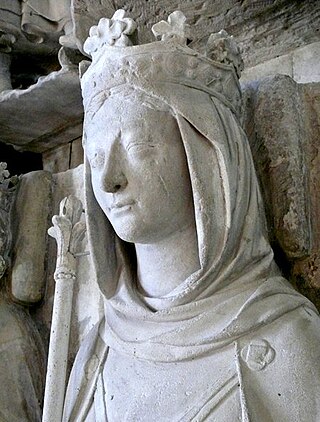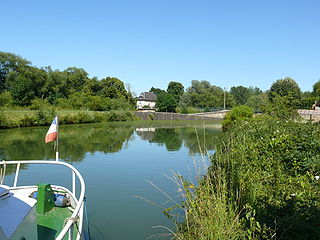
Alcuin of York – also called Ealhwine, Alhwin, or Alchoin – was a scholar, clergyman, poet, and teacher from York, Northumbria. He was born around 735 and became the student of Archbishop Ecgbert at York. At the invitation of Charlemagne, he became a leading scholar and teacher at the Carolingian court, where he remained a figure in the 780s and 790s. Before that, he was also a court chancellor in Aachen. "The most learned man anywhere to be found", according to Einhard's Life of Charlemagne, he is considered among the most important intellectual architects of the Carolingian Renaissance. Among his pupils were many of the dominant intellectuals of the Carolingian era.
Ratramnus a Frankish monk of the monastery of Corbie, near Amiens in northern France, was a Carolingian theologian known best for his writings on the Eucharist and predestination. His Eucharistic treatise, De corpore et sanguine Domini, was a counterpoint to his abbot Paschasius Radbertus’s realist Eucharistic theology. Ratramnus was also known for his defense of the monk Gottschalk, whose theology of double predestination was the center of much controversy in 9th-century France and Germany. In his own time, Ratramnus was perhaps best known for his Against the Objections of the Greeks who Slandered the Roman Church, a response to the Photian schism and defense of the filioque addition to the Niceno-Constantinopolitan Creed.

The Hermetica are texts attributed to the legendary Hellenistic figure Hermes Trismegistus, a syncretic combination of the Greek god Hermes and the Egyptian god Thoth. These texts may vary widely in content and purpose, but by modern convention are usually subdivided into two main categories, the "technical" and "religio-philosophical" Hermetica.

Rabanus Maurus Magnentius, also known as Hrabanus or Rhabanus, was a Frankish Benedictine monk, theologian, poet, encyclopedist and military writer who became archbishop of Mainz in East Francia. He was the author of the encyclopaedia De rerum naturis. He also wrote treatises on education and grammar and commentaries on the Bible. He was one of the most prominent teachers and writers of the Carolingian age, and was called "Praeceptor Germaniae", or "the teacher of Germany". In the most recent edition of the Roman Martyrology, his feast is given as 4 February and he is qualified as a Saint ('sanctus').

Hincmar, archbishop of Reims, was a Frankish jurist and theologian, as well as the friend, advisor and propagandist of Charles the Bald. He belonged to a noble family of northern Francia.
Gottschalk of Orbais was a Saxon theologian, monk and poet. Gottschalk was an early advocate for the doctrine of two-fold predestination, an issue that ripped through both Italy and Francia from 848 into the 850s and 860s. Led by his own interpretation of Augustine's teachings on the matter, he claimed the sinfulness of human nature and the need to turn to God with a humility for salvation. He saw himself as a divine vessel calling all of Christianity to repent for decades of Civil War. His attempts of this new Christianisation of Francia ultimately failed, his doctrine was condemned as heresy at the 848 council of Mainz and 849 council of Quierzy. Following his conviction as a heretic Gottschalk remained stubborn to his ideology disobeying the ecclesiastical hierarchy, making him an "actual heretic in the flesh", for this disobedience Gottschalk was placed in monastic confinement; however the shockwaves his ideology sent around Western Christendom refused to stop reverberating, Gottschalk managed to win over more followers and the threat remained up until his death in 868.

Adalard of Corbie was the son of Bernard who was the son of Charles Martel and half-brother of Pepin; Charlemagne was his cousin. He is recognised as a saint within the Roman Catholic and Eastern Orthodox Church.

Ermentrude of Orléans was the Queen of the Franks by her marriage to Charles II.

An archchancellor or chief chancellor was a title given to the highest dignitary of the Holy Roman Empire, and also used occasionally during the Middle Ages to denote an official who supervised the work of chancellors or notaries.
Publius Consentius was a 5th-century Latin grammarian and the author of two treatises, which are perhaps the fragments of a complete grammar: Ars de duabus partibus orationis, nomine et verbo, on the noun and the verb, which was much used during the Carolingian period, and Ars de barbarismis et metaplasmis, on barbarisms and metaplasm. The latter refers to a third essay, De structurarum ratione, on the structure of sentences, which, if ever published, no longer exists.
Mirrors for princes or mirrors of princes was a literary genre of didactic political writings throughout the Middle Ages and the Renaissance. It was part of the broader speculum or mirror literature genre.

Attigny is a commune in the Ardennes department in the Grand Est region of north-eastern France.
Remigius (Remi) of Auxerre was a Benedictine monk during the Carolingian period, a teacher of Latin grammar, and a prolific author of commentaries on classical Greek and Latin texts. He is also accredited with collecting and compiling other early medieval thinkers' commentaries on these works.
Annales Bertiniani are late Carolingian, Frankish annals that were found in the Abbey of Saint Bertin, Saint-Omer, France, after which they are named. Their account is taken to cover the period 830-82, thus continuing the Royal Frankish Annals (741–829), from which, however, it has circulated independently in only one manuscript. They are available in the Monumenta Germaniæ Historica and in a later French edition taking into account a newly discovered manuscript . The Annals of St. Bertin are one of the principal sources of ninth-century Francia, and are particularly well-informed on events in the West Frankish sphere of Charles the Bald. The Annales Fuldenses are usually read as an East Frankish counterpart to their narrative.

Leiden University Library, VLQ 79, also called the Leiden Aratea, is an illuminated copy of an astronomical treatise by Germanicus, based on the Phaenomena of Aratus. The manuscript was created in the region of Lorraine and has been dated to around 816. It was produced at the court of Louis the Pious, who ruled from 814–840. It is one of the four Carolingian codices that were produced in his court. There are many translations and copies of this text, so it is very well known throughout the Middle East and Europe.

Prudentius was bishop of Troyes, a chronicler and an opponent of Hincmar of Reims in the controversy on predestination.

The Holy Ampulla or Holy Ampoule was a glass vial which, from its first recorded use by Pope Innocent II for the anointing of Louis VII in 1131 to the coronation of Louis XVI in 1774, held the chrism or anointing oil for the coronation of the kings of France.
The Epistola de litteris colendis is a well-known letter addressed by Emperor Charlemagne to Abbot Baugulf of Fulda, probably written sometime in the late 780s to 800s (decade), although the exact date is still debatable. The letter is a very important witness to the Carolingian educational reforms during the Carolingian Renaissance from the late 8th century to the 9th century. The letter shows Emperor Charlemagne's interest in promoting learning and education within his empire.

Maurice Prou was a French archivist, paleographer and numismatist.
Amulo Lugdunensis served as Archbishop of Lyon from 841 to 852 AD. As a Gallic prelate, Amulo is best known for his letters concerning two major themes: Christian–Jewish relations in the Frankish kingdom and the Carolingian controversy over predestination. He was ordained as archbishop in January 841.










